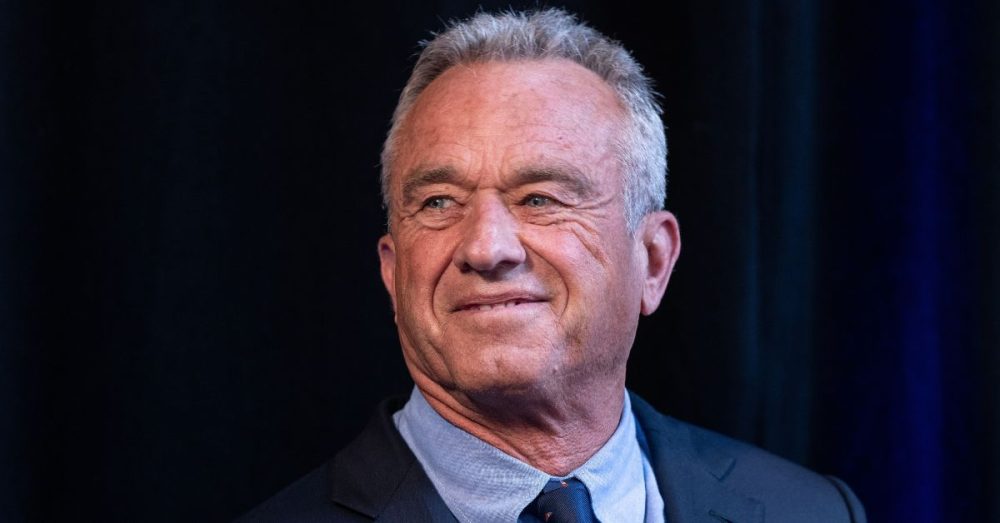RFK Jr. will be on the Texas general election ballot in November alongside former President Donald Trump and Vice President Kamala Harris.
“OFFICIALLY CERTIFIED ON THE BALLOT IN TEXAS,” Kennedy wrote in all caps on X, the social media platform formerly known as Twitter.
“Our incredible volunteers collected nearly a quarter of a million signatures in just two months, overcoming the most difficult ballot access requirement in the country. We’re celebrating hard over here at Team Kennedy — YAY!”
He concluded with just three words, “Thank you, Texas!”
OFFICIALLY CERTIFIED ON THE BALLOT IN TEXAS
Our incredible volunteers collected nearly a quarter of a million signatures in just two months, overcoming the most difficult ballot access requirement in the country. We’re celebrating hard over here at Team Kennedy — YAY!
Thank… pic.twitter.com/0CV9m10XgJ
— Robert F. Kennedy Jr (@RobertKennedyJr) August 9, 2024
The announcement was made late Thursday through a letter from Texas Secretary of State Jane Nelson’s office.
The letter states, “After review, your application has been accepted. Your name will appear on the ballot for the 2024 General Election as an Independent candidate for the Office of President of the United States. Nicole Shanahan will also appear on the ballot as the Vice-Presidential candidate.”
“State law requires an independent candidate for president in 2024 to submit a petition with 113,151 signatures from Texans who are both registered to vote and did not vote in the March Primary Elections. Mr. Kennedy’s petition contained 122,513 valid signatures.”
Attached to his tweet, the son of slain 1968 presidential contender Robert F. Kennedy and nephew to President John F. Kennedy posted pictures of himself and his running mate Nicole Shanahan carrying the last of their roughly 250,000 ballot petition signatures into Nelson’s office.
The Dallas Express had attended an event in Austin in May held by Kennedy and Shanahan shortly after those photos were taken, where the top of the ticket told the audience he and Shanahan went above and beyond garnering the required signatures just in case any signature’s validity was challenged.
In June, Democrats and their allies announced numerous lawsuits attempting to keep Kennedy off the ballot in several swing states. Similarly, in July, Democrats in Texas unsuccessfully challenged Kennedy’s ballot signatures, claiming most were invalid.
At the Austin event, Kennedy gave a rousing speech that focused on improving public health, not through a syringe but through “bolster[ing] our immune systems, bolster[ing] the thing God gave us.” He advocated for regenerative agriculture, avoiding harmful pesticides, and unwinding the alleged corporate capture of government agencies that he believes has led to the current skyrocketing rates of chronic disease.
Shanahan, who spoke before him, laid out her vision for restoring America’s rich soil quality as a means of improving public health.
In a previous exchange with The Dallas Express, Kennedy took aim at federal public health agencies for not taking a tougher stance against toxic chemicals used in everyday products, such as herbicides.
“The [National Institute of Health], because it is captured by the chemical industry, does not do the kind of studies [and] does not require the kind of studies that need to be done to determine the safety of these products –– and because of that, the manufacturers get to keep poisoning people and animals, etc., without any consequences,” he said.
“I am going to shift NIH’s priorities to do those studies,” he added. “I cannot tell you that we are going to ban every bad chemical, but I can put enough science out there that the lawyers can now litigate against the chemical company and let the market shut down that chemical very quickly.”
Kennedy was responding to a question by DX about what he would do about glyphosate contamination in Texas’ waterways if elected president. Texas has long had a problem with pesticides and herbicides turning up in drinking water. Nearly 500 water utilities across Texas tested positive for the weedkiller atrazine, which studies have shown can cause deformities in male genitalia, The Texas Tribune reported in 2019.
While DX reported that federal agencies maintain the safety of glyphosate, branches of government in Europe are moving away from the widely used herbicide. The WHO has called it a “carcinogen,” and Monsanto has settled numerous lawsuits related to its herbicide product, Roundup.


